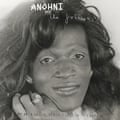You would be hard-pushed to call Anohni’s sixth studio album – her first since Hopelessness seven years ago – anything other than an unexpected departure. Whatever path you imagined her admirably peripatetic career might take next, it’s unlikely you pictured it involving a collaboration with Jimmy Hogarth, producer and songwriter for the likes of James Blunt. Anohni’s recent releases had shifted her ever further into the musical left field – or rather, back towards the left field from where she sprang, Anohni being, in the words of her friend Rufus Wainwright, “a real underground downtown institution” in New York clubland long before the Mercury-winning success of 2005’s I Am a Bird Now (recorded as Antony and the Johnsons) led another friend, Boy George, to suggest she could “outstrip Norah Jones and sell millions of records”. The feeling that the left field might have appealed more than the mainstream was hard to escape when listening to her 2020 cover of Bob Dylan’s It’s All Over Now, Baby Blue, her voice deliberately distorted in a way that made you wince. Or indeed the same year’s RNC 2020, a melange of screams and feedback that even its creator described as “pretty rough”.
But, three years on, here is Anohni’s album-length collaboration with the writer of James Bay’s gold-selling 2015 single If You Ever Want to Be in Love and Duffy’s Warwick Avenue. You can speculate as to the reasons – a disinclination to be pigeonholed? A desire for her serious lyricism about the climate crisis, gender and capitalism to reach as wide an audience as possible? Whatever the reason, My Back Was a Bridge for You to Cross may be the most approachable album Anohni has made since the mid-00s.
There’s still something deeply uncompromising about it: the lyrics are a potent stew of grief, environmental apocalypse and excoriations of transphobia; a brief track called Go Ahead features Anohni’s voice at its most stentorian over noisy freeform guitar and what sounds like feedback, but is apparently a recording of a lemur’s song. But its default setting involves simple electric guitar figures, bass and drums, occasionally shaded with sax or piano or delicate orchestrations, carrying the retro-soul flavour of Hogarth’s best-known songs. Anohni has mentioned Marvin Gaye’s What’s Going On as an influence, and you can catch something of the atmosphere of that album’s looser tracks – Wholy Holy, Save the Children – on Why Am I Alive Now? and There Wasn’t Enough.
For all its idiosyncratic intensity, Anohni’s voice is a remarkably portable instrument, as much at home performing over Hercules and Love Affair’s disco-infused house as it is essaying Nico’s Janitor of Lunacy accompanied by former members of Throbbing Gristle. But its setting on My Back Was a Bridge for You to Cross feels like a particularly good fit, underlining her links to old blues, jazz and R&B singers. It’s an album that offers one subtly striking song after another. You could read It Must Change as a desperate love song, or another in its author’s series of warnings about impending environmental collapse – the accompanying video, with its footage of California wildfires, suggests the latter – but it feels wrenching however you interpret it.
Can’t, meanwhile, starkly details the aftermath of a friend’s suicide – “You are dead, I am here stranded among the living” – to the accompaniment of surprisingly bouncy funk that builds to a crescendo while Anohni repeats the title over and over again: misery that becomes a type of catharsis. She perceives death through a more tender lens on Sliver of Ice, concerned with the last days of her friend and mentor Lou Reed, imminent death heightening his appreciation of life’s simplest pleasures, including the sensation of an ice cube melting on his tongue. Sweetly, the tremolo-heavy guitar evokes dreamy doo-wop and early rock’n’roll ballads, music beloved of its subject.
The standout is Scapegoat, a stately ballad that details the psychological impact of the row over trans rights and how it feels when everyone appears to have a strident opinion on your existence: “A scapegoat is all I can be … I take all of your hate into my flesh and body.” Anohni sings with so much vibrato that her voice starts to resemble a choked sob. There’s a shiver-inducing moment midway through when the band stop dead, before a vast, discordant A Day in the Life-style sweep of strings reintroduces them.
after newsletter promotion
There are a couple of points where the simplicity of the arrangements makes the songs feel slightly formulaic, but even then, Anohni’s voice is captivating. She seldom seems like anything other than an extraordinary artist – it’s instructive to look back at the press around I Am a Bird Now and realise how much of the current discourse about gender its songs presaged nearly 20 years ago – but My Back Was a Bridge for You to Cross feels like a particularly powerful entry in her discography: surrounded by music that’s beautiful but relatively straightforward, that voice seems more extraordinary still.
This week Alexis listened to
James Blake – Big Hammer
A triumphant pivot from sad singer-songwriter territory back to bass music: instrumental save for dancehall vocal samples, driven by fidgety synth and immense sub-bass.

